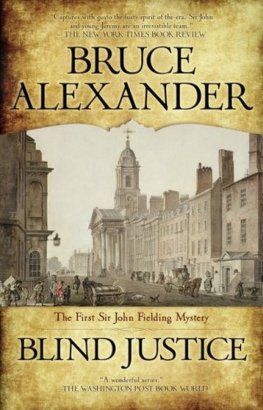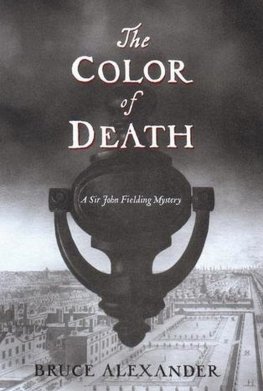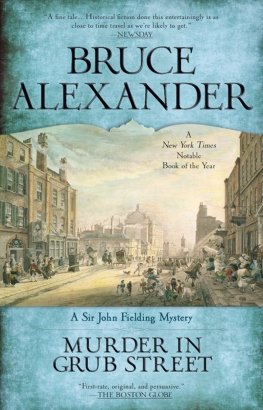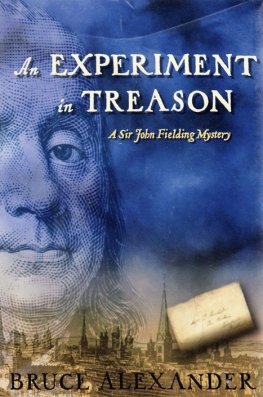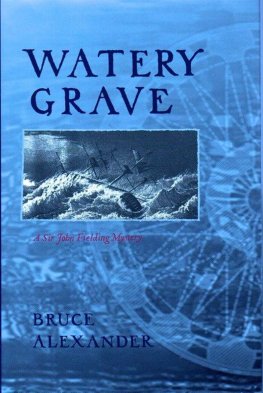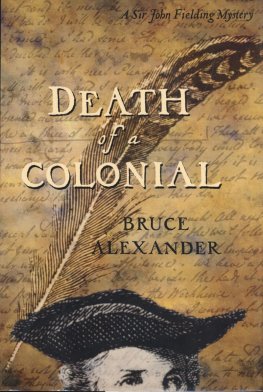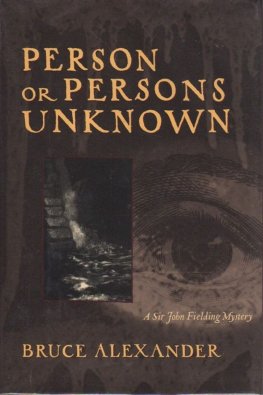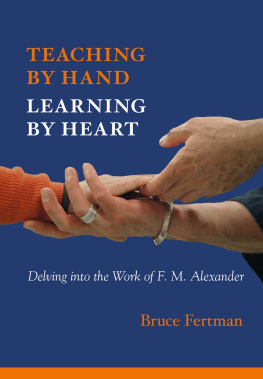Bruce Alexander - Blind Justice
Here you can read online Bruce Alexander - Blind Justice full text of the book (entire story) in english for free. Download pdf and epub, get meaning, cover and reviews about this ebook. year: 1995, publisher: Berkley, genre: Detective and thriller. Description of the work, (preface) as well as reviews are available. Best literature library LitArk.com created for fans of good reading and offers a wide selection of genres:
Romance novel
Science fiction
Adventure
Detective
Science
History
Home and family
Prose
Art
Politics
Computer
Non-fiction
Religion
Business
Children
Humor
Choose a favorite category and find really read worthwhile books. Enjoy immersion in the world of imagination, feel the emotions of the characters or learn something new for yourself, make an fascinating discovery.
- Book:Blind Justice
- Author:
- Publisher:Berkley
- Genre:
- Year:1995
- Rating:5 / 5
- Favourites:Add to favourites
- Your mark:
- 100
- 1
- 2
- 3
- 4
- 5
Blind Justice: summary, description and annotation
We offer to read an annotation, description, summary or preface (depends on what the author of the book "Blind Justice" wrote himself). If you haven't found the necessary information about the book — write in the comments, we will try to find it.
Blind Justice — read online for free the complete book (whole text) full work
Below is the text of the book, divided by pages. System saving the place of the last page read, allows you to conveniently read the book "Blind Justice" online for free, without having to search again every time where you left off. Put a bookmark, and you can go to the page where you finished reading at any time.
Font size:
Interval:
Bookmark:
Bruce Alexander
BLIND JUSTICE
Chapter One
Having often been asked to commit to print these memories of my association with the late Sir John Fielding, the celebrated magistrate of the Bow Street Court, I now set pen to paper for the first time, determined not merely to illuminate the feats of detection for which he is so justly renowned, but also to set forth those prodigious qualities of character that enabled him to accomplish them. He was indeed a man of remarkable powers. Although deprived of his sight, what most would deem the cardinal of the senses, Sir John nevertheless led an exemplary life. His professional achievements are, of course, well remembered. With his half-brother Henry, the late, lamented romancer and jurist, he organized and commissioned that band of worthies known ever after as the Bow Street Runners. These thief-takers have functioned as Londons constabulary and made safe even by night a city in which previously, as even one of their severest critics declared, one was forced to travel even at noon as if one was going to battle.
As magistrate. Sir John sat daily, judging in all fairness the poor wretches who were paraded before him, giving unto each the full measure of his keen intellect, questioning witness and accused with like impartiality. Finding cause, he would of course bind over for trial. Yet such was his nature that the mere accusation of a felony was never sufficient in itself to doom a man to an ordeal before the bench at Old Bailey. Unlike many of his fellow magistrates, he demanded evidence. He required direct witness of the eyes, valuing above all else what he himself could not have given. Should one appear before him and have the temerity to offer as truth what had been merely heard or supposed, that unworthy would immediately feel the sharp, quick lash of Sir Johns tongue and be sent on his way forthwith. In truth, he discharged more prisoners than he sent on for trial. Never lenient, he was albeit exact. And he was particularly watchful (if indeed one may use so fanciful a conceit with regard to one who lacked the power of sight) of those so-called independent thief-takers, masters of false witness and entrapment, who made it practice to deliver the innocent up as guilty. Of this sinister legacy from the days of the notorious Jonathan Wild I myself had direct experience, for I, reader, truth to tell, first laid eyes upon the good Sir John when I found myself brought before the bench of the Bow Street Court as one accused of thieving.
Pray, let not this confession shock you so that you be tempted to set aside this eulogy, for as it will soon be shown, accused though I may have been, my accusers themselves were the true thieves; though what they plundered from me and sought to destroy was my own good name. Indeed it may be said true that I, Jeremy Proctor, myself now a member of the bar, first saw the inside of a court of law as defendant. How I came to be there I shall briefly impart, though to recall those terrible circumstances now brings me pain some thirty years after the event. Nevertheless, now to my history:
I was born in the year 1755 in the town of Lichfield, also the birthplace of the great lexicographer Samuel Johnson. There, my father, a printer by trade, earned an honorable living for himself and his small family in the assistance of a master printer, one John Berkeley by name. Of us Proctors there were but four: my father, my mother, my brother, Matthew, who was two years my junior, and myself. When a plague of typhus settled upon Lichfield in the summer of 1765, it claimed my mother and my brother. Having then but two mouths to feed and being enterprising by nature, my father set forth the following year for the village of Stoke Poges with his savings and me, having determined to seek his fortune with a print shop of his own. He should have chosen a better site.
In the beginning he prospered, finding commissions aplenty from parishes in the area, a few merchants, and from the local squire. His stock-in-trade was handbills, programs and adverts of one nature or another. He also instructed me in the trade, and to this day my skill in setting type is cause for amazement among my colleagues, most of whom have no knowledge of trade of any sort. My father also tutored me in letters and sums, and by near my thirteenth year had undertaken to teach me some Latin and what he knew of the French language. What he knew was considerable. Though an autodidact himself, he took great interest in the language and literature of our near neighbors across the water. Yet it has ever beeti so that an interest in things French has carried with it a certain risk here in England, and so it was for him, for it ultimately proved his undoing and led to his death.
Being something of a freethinker himself, he had a great passion for the writings of the philosopher and romancer who signed himself Voltaire. He had arrived at a point where he wished to demonstrate that he was capable in his art of something more than the handbills he turned out daily, and so he resolved to print a pamphlet. Because he claimed no skill as a writer and no doubt also because he wished to propagate the views of M. Voltaire, my father set about to translate a pamphlet of the Frenchman, the name of which I have blotted from my mind. The resultant work, which he titled A Call to Thought, he hoped to sell for the odd penny. But since he reckoned it primarily as a sample of his work as a printer, he freely distributed it gratis through the village, making sure in particular that copies were put in the hands of his regular customers. Among them were, as I earlier mentioned, certain members of the local clergy. They were generally displeased by the pamphlet; not my fathers printing, of which they appreciated little; nor by his translation, which they appreciated less; but rather by the sentiments of M. Voltaire, whom they deemed an atheist and a troublemaker. One spoke sharply to him of the content of the essay, and my father was unwise enough to argue the matter with him.
That man, by name Mr. Pettigrew, who headed a congregation of Low Church brethren, felt most specially grieved by the pamphlet, and with him my father argued most vehemently and imprudently; for Pettigrew (I cannot bring myself to use the honorific further) preached a sermon of a Sunday against atheism in general, Voltaire in particular, and my father most specifically. I know not what was said, for I have not been from that time to this a communicant, but it was sufficient to stir the congregation to wrath and dispatch it forth as a mob of avenging angels to wTeak havoc upon us. They marched straightaway to the print shop and beat upon the door demanding entry. My father, warning me to remain in our rooms above, descended bravely with the intention of calming and dispersing the mob. Yet no sooner had he appeared before them than they set upon him and abused him unmercifully. From above I watched, cowering shamefully, I allow, as the congregation knocked and kicked him senseless, then cast him aside and poured through the doors of our shop. Once inside, they smashed the press and scattered type. All this I heard and merely guessed at as I hid in our two rooms above. The destruction complete, the mobs fury somewhat dissipated. The good people of Stoke Poges retired, dragging after them the dazed and inert body of my father.
When next I set eyes upon him he had been clamped in the stocks. He had been brought before the local magistrate, charged with blasphemy, convicted as a matter of course, and sentenced to a week in the stocks. He was to be released the following Sunday, when he might then take himself to the church and beg Gods pardon, the congregations-and Pettigrews, of course. Yet my father never lived past Tuesday. What know you, reader, of this cruel and humiliating punishment which is still practiced in some benighted corners of the realm? It is no joke, as some seem to hold it, for a man to be trapped head and hands between two blocks of wood, his face a target of all manner of filth which the brutes of the village may wish to pelt him with.
Font size:
Interval:
Bookmark:
Similar books «Blind Justice»
Look at similar books to Blind Justice. We have selected literature similar in name and meaning in the hope of providing readers with more options to find new, interesting, not yet read works.
Discussion, reviews of the book Blind Justice and just readers' own opinions. Leave your comments, write what you think about the work, its meaning or the main characters. Specify what exactly you liked and what you didn't like, and why you think so.

